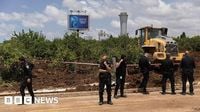In a significant escalation of hostilities, Israel launched air strikes on Yemen’s Hodeidah port and a cement factory on May 5, 2025, just one day after the Houthi militia fired a ballistic missile that struck near Ben Gurion International Airport in Israel. The missile attack, which occurred on May 4, injured six people and marked the first successful missile strike on the airport since the conflict began.
The Israeli military, known as the Israel Defense Forces (IDF), reported that approximately 20 fighter jets participated in the operation, which targeted sites they claimed were integral to Houthi operations against Israel. According to the IDF, the Hodeidah port serves as a key hub for the transfer of Iranian weapons and military equipment, while the Bajil cement factory was described as a vital economic resource used for constructing tunnels and military infrastructure.
"The seaport in Hodeidah is used for the transfer of Iranian weapons, equipment for military purposes, and other terror-related needs," the IDF stated. Houthi-run media reported that the air strikes resulted in at least 21 injuries, with the health ministry spokesperson Anees al-Asbahi confirming the casualties.
The missile fired by the Houthis on May 4 landed near an access road close to the main terminal of Ben Gurion Airport, briefly halting flights and causing panic among travelers. Israeli emergency services reported that four individuals were injured due to the blast, with additional injuries occurring as people rushed to shelters.
Israeli Prime Minister Benjamin Netanyahu had vowed retaliation following the missile attack, declaring, "We attacked in the past, we will attack in the future." This sentiment was echoed by military officials, who emphasized that the strikes were a direct response to the Houthi aggression. Reports indicated that Netanyahu and Defense Minister Israel Katz oversaw the operation from a command center in Tel Aviv.
In the wake of the missile attack, the Houthis announced plans to impose a "comprehensive aerial blockade" on Israel, targeting airports in retaliation for what they perceive as Israeli aggression. They claimed responsibility for the missile strike, asserting it was a response to Israel’s ongoing military operations in Gaza.
"The aggressive Zionist-American raids on civilian facilities will not affect our military operations against the Zionist enemy entity," stated Nasruddin Amer, head of the Houthi media office. He warned of further escalations and emphasized the group’s commitment to continue its attacks.
Despite the ongoing conflict, the situation in Yemen remains dire, with the Hodeidah port being the main conduit for food imports, fuel, and humanitarian aid into the impoverished northern region, where over 20 million people reside. The strikes on May 5 are part of a larger pattern of retaliatory attacks between Israel and the Houthis, who have launched over 100 missiles and drones at Israel since November 2023.
The air strikes on Hodeidah are not the first Israeli military actions in Yemen. Previous strikes have targeted various sites, including the Ras Isa oil terminal, which resulted in casualties. The ongoing conflict has seen both sides engage in a cycle of retaliatory attacks, with the Houthis pledging to continue their missile strikes until the Israeli campaign in Gaza ceases.
U.S. involvement in the region has also been significant, with American forces conducting air strikes against Houthi targets. A U.S. defense source confirmed that while U.S. forces did not participate in the Israeli strikes on May 5, there may have been non-lethal support provided. The U.S. military's operations against the Houthis have intensified under the Biden administration and continued under President Trump, who has vowed to eliminate the group.
As tensions escalate, the potential for further conflict looms large. The Houthis, who have consistently framed their attacks as acts of solidarity with Palestinians, are likely to continue their aggressive posture in response to Israeli actions. With the situation in Gaza remaining volatile, the dynamics of the conflict between Israel and the Houthis will undoubtedly evolve in the coming days.
As the international community watches closely, the implications of these strikes extend beyond the immediate region, raising concerns about the stability of maritime routes in the Red Sea and the broader geopolitical landscape involving Iran’s influence in the area.





